 Senior Fellow
Senior Fellow
[email protected]
Washington DC
202.601.2351
Activities
Miles Pomper is a Senior Fellow in the Washington DC office of CNS. His work focuses on nuclear energy, nuclear nonproliferation, nuclear security, and nuclear arms control. He holds a master’s degree in international affairs from Columbia University and a master’s degree in journalism from Northwestern University.
Areas of Research
- Nuclear energy
- Nuclear nonproliferation and arms control
- Nuclear security
Background
Before joining CNS he served as Editor-in-Chief of Arms Control Today from 2003-2009. Previously, he was the lead foreign policy reporter for CQ Weekly and Legi-Slate News Service, where he covered the full range of national security issues before Congress, and a Foreign Service Officer with the US Information Agency.
Education
- BA in History from Columbia University
- MA in international affairs from Columbia University
- MA in journalism from Northwestern University
CNS Work
- OP64: Nuclear Verification’s Holy Grail: Verifying Nuclear Warheads — a new approach
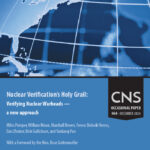 This paper presents verification methods, technologies, and measures that may be used to design a verification protocol for any type of warhead stockpile agreement.
This paper presents verification methods, technologies, and measures that may be used to design a verification protocol for any type of warhead stockpile agreement. - OP#62: The Future of NATO’s Nuclear Posture and Arms Control in Today’s More Dangerous World
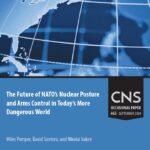 At the present moment, it is hard to see grounds for optimism when it comes to nuclear arms control or risk reduction.
At the present moment, it is hard to see grounds for optimism when it comes to nuclear arms control or risk reduction. - Nuclear energy could power the AI boom—but only if proliferation risks are minimized
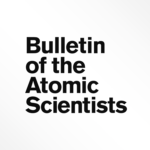 The United States should prioritize support to industry players that have minimized the proliferation risks of their prospective technology.
The United States should prioritize support to industry players that have minimized the proliferation risks of their prospective technology. - Charting a roadmap for multiparty confidence and security building measures, risk reduction, and arms control in the Indo-Pacific
 This work contains contributions by CNS’s Miles Pomper, Allison Berke, Ferenc Dalnoki-Veress, and George M. Moore.
This work contains contributions by CNS’s Miles Pomper, Allison Berke, Ferenc Dalnoki-Veress, and George M. Moore. - InFocus with Ejaz Haider -Ep 23, Nov 8: The Unraveling of Arms Control and Nonproliferation
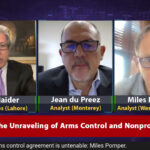 A conversation on the future of arms control and nonproliferation in the wake of Russia’s de-ratification of the CTBT and other ongoing events.
A conversation on the future of arms control and nonproliferation in the wake of Russia’s de-ratification of the CTBT and other ongoing events. - First steps on a long path: seizing the opportunity to reduce US-China nuclear risks
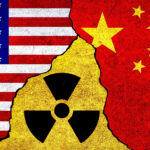 Incentivizing China to see nuclear and risk reduction as beneficial rather than detrimental will require skillful U.S. diplomacy to leverage pressure from allies in Europe and regional states.
Incentivizing China to see nuclear and risk reduction as beneficial rather than detrimental will require skillful U.S. diplomacy to leverage pressure from allies in Europe and regional states. - Russian Nuclear Weapons In Belarus? A CNS Roundtable Discussion
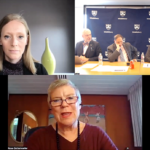 Discussion on Putin’s announcement that Russia will deploy tactical nuclear warheads to Belarus.
Discussion on Putin’s announcement that Russia will deploy tactical nuclear warheads to Belarus. - OP#57: Radiological Security in Contested Territories
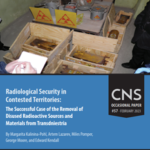 One of the few success stories in the elimination of radioactive sources from a contested territory is the Republic of Moldova’s removal of approximately 2,700 disused radioactive materials from the breakaway region of Transdniestria.
One of the few success stories in the elimination of radioactive sources from a contested territory is the Republic of Moldova’s removal of approximately 2,700 disused radioactive materials from the breakaway region of Transdniestria. - OP55: Everything Counts: Building a Control Regime for Nonstrategic Nuclear Warheads in Europe
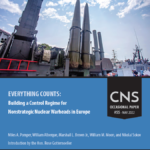 Such an agreement will face major negotiating and implementation challenges—not only between Washington and Moscow, but also between Washington and NATO European allies.
Such an agreement will face major negotiating and implementation challenges—not only between Washington and Moscow, but also between Washington and NATO European allies. - Russian-Ukraine War Updates Interview
 CNS expert Miles Pomper interviewed in English by BeFM, a Korean-English broadcast.
CNS expert Miles Pomper interviewed in English by BeFM, a Korean-English broadcast.
Select Bibliography (Recent)
- “The Proliferation of Weapons of Mass Destruction in the Modern World: Trends and Changing Regimes,” in International Politics in Times of Change, Nicholas Tzidakis, Ed. Springer 2012.
- “How to Unsnag US-South Korea Nuclear Negotiations,” Bulletin of the Atomic Scientists, September 25, 2012.
- “Nuclear Power and Proliferation: The Risks of the Nuclear Renaissance,” in Nuclear Power and Energy Security in Asia, Rajesh Basrur, Cole Harvey, Koh Swee Lean Collin, eds., (New York, NY: Routledge, 2012).
- “The Seoul Nuclear Security Summit: How Much of a Success?” Academic Paper Series, Korea Economic Institute, May 23, 2012.
- “Domestic and International Politics of Spent Fuel in South Korea: Are We Approaching Meltdown?” with Seong-Won Park and Lawrence Scheinman, Academic Paper Series: On Korea, Vol. 4, Korea Economic Institute, 2011.
- “Going Global: Issues Facing South Korea as an Emerging Nuclear Exporter,” with Chen Kane and Stephanie Lieggi, Tomorrow’s Northeast Asia: Joint US-Korea Academic Studies, Volume 21, Korea Economic Institute, 2011.
- “The IAEA’s Political Balancing Act,” with Michelle Dover, World Politics Review, September 2011.
- “Bringing Belarus Back to the Table,” WMD Junction, September 20, 2011.
- “Toward the Global Norm: Supporting the Minimization of Highly Enriched Uranium in the Civilian Sector,” with Cole J. Harvey and David Slungaard, Issue Brief No. 12, Asan Institute, June 2011.
- “Japan’s Nuclear Crisis: The Fine Line between Security and Insecurity,” Bulletin of the Atomic Scientists, March 22, 2011.
- “Nuclear Power and Spent Fuel in East Asia: Balancing Energy, Politics and Nonproliferation,” with Ferenc Dalnoki-Veress, Stephanie Lieggi, and Lawrence Scheinman, The Asia-Pacific Journal vol. 25, June 21, 2010.
- “US International Nuclear Energy Policy: Change and Continuity,” Nuclear Energy Futures Paper #10, Centre for International Governance Innovation, January 2010.
- “Reducing and Regulating Tactical (Nonstrategic) Nuclear Weapons in Europe: Moving Forward?” with Johan Bergenas, William Potter, and Nikolai Sokov, April 2010.
- “Managing U.S. Missile Defenses and Russian Concerns,” with Dennis Gormley and Nikolai Sokov, Four Emerging Issues in Arms Control, Disarmament, and Nonproliferation: Opportunities for German Leadership, James Martin Center for Nonproliferation Studies, July 14, 2009.
- “Reducing and Regulating Tactical (Nonstrategic) Nuclear Weapons in Europe,” with William Potter and Nikolai Sokov, December 2009.
- “The Russian Nuclear Industry: Status and Prospects,” Nuclear Energy Futures Paper #3, Centre for International Governance Innovation, January 2009.
- “Congress, Culture, and the Caspian,” with David King, in The Limits to Culture: Foreign Policy, Islam, and the Caspian, Brenda Shaffer, ed., (Cambridge, MA: Belfer Center for Science and International Affairs, 2006).
